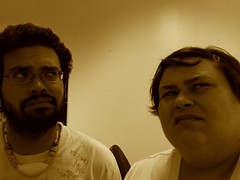United Nations, United Natives

FOR IMMEADIATE RELEASE
Contact: Keith Camacho
Email: decolonizeguam@gmail.com
Chamorro Delegation Urges United Nations Intervention on Human Rights Violations in Guam
New York City, June 20, 2007 — Chamorros from Guam today testified before the United Nations Special Committee of 24 on Decolonization to insist the international community pay closer attention to Guam's continued colonial status as the United States, its Administering Power, increases its already large military presence on the island.
The UN General Assembly created the Committee of 24 to consider appropriate forms of self-government for the world's 16 remaining Non-Self-Governing Territories (NSGT), including Guam.
Delagations from Guam have appealed to the Committee of 24 for more than 20 years regarding Guam's political status and the United States' refusal to respect the Chamorro people's right to self-determination. Today's delegation represents a second wave of Chamorros demanding their right to sovereignty.
Hope Antoinette Cristobal, a Chamorro and Doctor of Psychology called attention to the health effects colonization has had on the people of Guam.
"The colonization of Guam has had an impact on the psychological disposition of my people," said Cristobal, who has dedicated her academic training and career to the study of colonized and marginalized indigenous communities. "The Chamorro population in Guam experiences a wide array of health, mental health, and legal problems. My people are over-represented in correctional facilities, probation rolls, and within the mental health system. My people suffer high rates of family violence, substance abuse, teenage suicides, school drop-outs, and other social problems."
The United Nations is obligated to do more to address the continued colonial status of Guam, which remains on the UN list of Non-Self Governing Territories said Keith L. Camacho, an assistant professor in the Department of Asian American Studies at the University of California, Los Angeles.
"To date, neither the United States nor the United Nations has made any sustained attempt to prepare the Chamorro people of Guam toward 'self-determination,' as defined by United Nations Resolution 1541," said Camacho, a researcher in issues of colonization and decolonization in the Pacific Islands and elsewhere. "In fact, the United States history of political relations with Guam can be best described as one of apathy, ignorance, racism and unilateralism. On the other hand, Chamorro activists, attorneys, community organizers, educators, policy makers and religious leaders boast a history of critical anti-colonialism that has not been heeded by the United States and the United Nations. Thus, the question of political status in Guam remains unresolved, if not temporarily stalled."
Sabina Flores Perez, an indigenous Chamorro who testified before the UN Special Political and Decolonization Committee in October 2006 said after 20 years of appeals, it is time for the United Nations and the International community to respond to Guam.
"In this time of great need for Chamorros and Guam, with the overwhelming burden of inequality accumulating, the expediting of the current US militarization, the huge conflicts of interest of those entrusted with preserving our human rights and their subsequent disregard for it, it is essential to ensure that all the accomplishments of our forebears on behalf of decolonization and self-determination be maintained," said Perez, who has organized educational campaigns against privatization of natural resources, environmental contamination and militarization on Guam. "Moreover, it is essential that greater attention is paid to the situation of Guam and that the island receives an appropriate response from the international community."
###
Contact: Keith Camacho
Email: decolonizeguam@gmail.com
Chamorro Delegation Urges United Nations Intervention on Human Rights Violations in Guam
New York City, June 20, 2007 — Chamorros from Guam today testified before the United Nations Special Committee of 24 on Decolonization to insist the international community pay closer attention to Guam's continued colonial status as the United States, its Administering Power, increases its already large military presence on the island.
The UN General Assembly created the Committee of 24 to consider appropriate forms of self-government for the world's 16 remaining Non-Self-Governing Territories (NSGT), including Guam.
Delagations from Guam have appealed to the Committee of 24 for more than 20 years regarding Guam's political status and the United States' refusal to respect the Chamorro people's right to self-determination. Today's delegation represents a second wave of Chamorros demanding their right to sovereignty.
Hope Antoinette Cristobal, a Chamorro and Doctor of Psychology called attention to the health effects colonization has had on the people of Guam.
"The colonization of Guam has had an impact on the psychological disposition of my people," said Cristobal, who has dedicated her academic training and career to the study of colonized and marginalized indigenous communities. "The Chamorro population in Guam experiences a wide array of health, mental health, and legal problems. My people are over-represented in correctional facilities, probation rolls, and within the mental health system. My people suffer high rates of family violence, substance abuse, teenage suicides, school drop-outs, and other social problems."
The United Nations is obligated to do more to address the continued colonial status of Guam, which remains on the UN list of Non-Self Governing Territories said Keith L. Camacho, an assistant professor in the Department of Asian American Studies at the University of California, Los Angeles.
"To date, neither the United States nor the United Nations has made any sustained attempt to prepare the Chamorro people of Guam toward 'self-determination,' as defined by United Nations Resolution 1541," said Camacho, a researcher in issues of colonization and decolonization in the Pacific Islands and elsewhere. "In fact, the United States history of political relations with Guam can be best described as one of apathy, ignorance, racism and unilateralism. On the other hand, Chamorro activists, attorneys, community organizers, educators, policy makers and religious leaders boast a history of critical anti-colonialism that has not been heeded by the United States and the United Nations. Thus, the question of political status in Guam remains unresolved, if not temporarily stalled."
Sabina Flores Perez, an indigenous Chamorro who testified before the UN Special Political and Decolonization Committee in October 2006 said after 20 years of appeals, it is time for the United Nations and the International community to respond to Guam.
"In this time of great need for Chamorros and Guam, with the overwhelming burden of inequality accumulating, the expediting of the current US militarization, the huge conflicts of interest of those entrusted with preserving our human rights and their subsequent disregard for it, it is essential to ensure that all the accomplishments of our forebears on behalf of decolonization and self-determination be maintained," said Perez, who has organized educational campaigns against privatization of natural resources, environmental contamination and militarization on Guam. "Moreover, it is essential that greater attention is paid to the situation of Guam and that the island receives an appropriate response from the international community."
###
Labels: Chamorro, Decolonization, UN







